- Fed Chair Powell testimony, U.S. jobs report will dictate the market’s direction this week.
- Dick’s Sporting Goods stock is a buy ahead of earnings.
- Stitch Fix shares are set to struggle on weak sales and sluggish outlook.
Stocks on Wall Street rallied on Friday to end a volatile week, as Treasury yields eased back from their recent highs while investors continued to assess the outlook for tighter Fed policy in the months ahead.
For the week, the blue-chip Dow Jones Industrial Average rose 1.7% to snap a four-week losing streak. Meanwhile, the benchmark S&P 500 and the tech-heavy Nasdaq Composite tacked on 1.9% and 2.6%, respectively. The small-cap Russell 2000 jumped 2%.
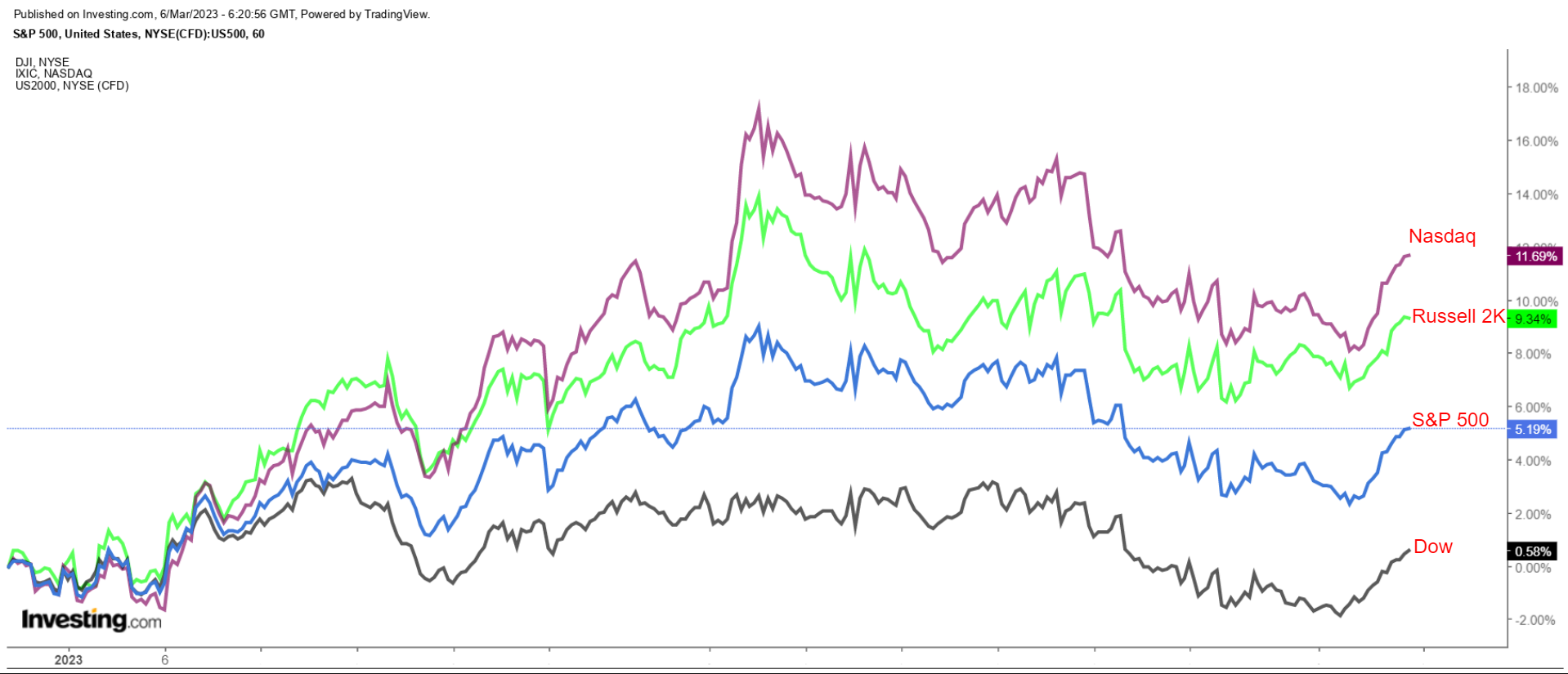
The week ahead will feature key Congressional testimony from Federal Reserve Chairman Jerome Powell as investors look for more clues on the size and pace of further rate hikes.
Elsewhere, on the economic calendar, most important will be Friday’s U.S. employment report for February, which is forecast to show solid job gains but a slowing from January’s robust growth.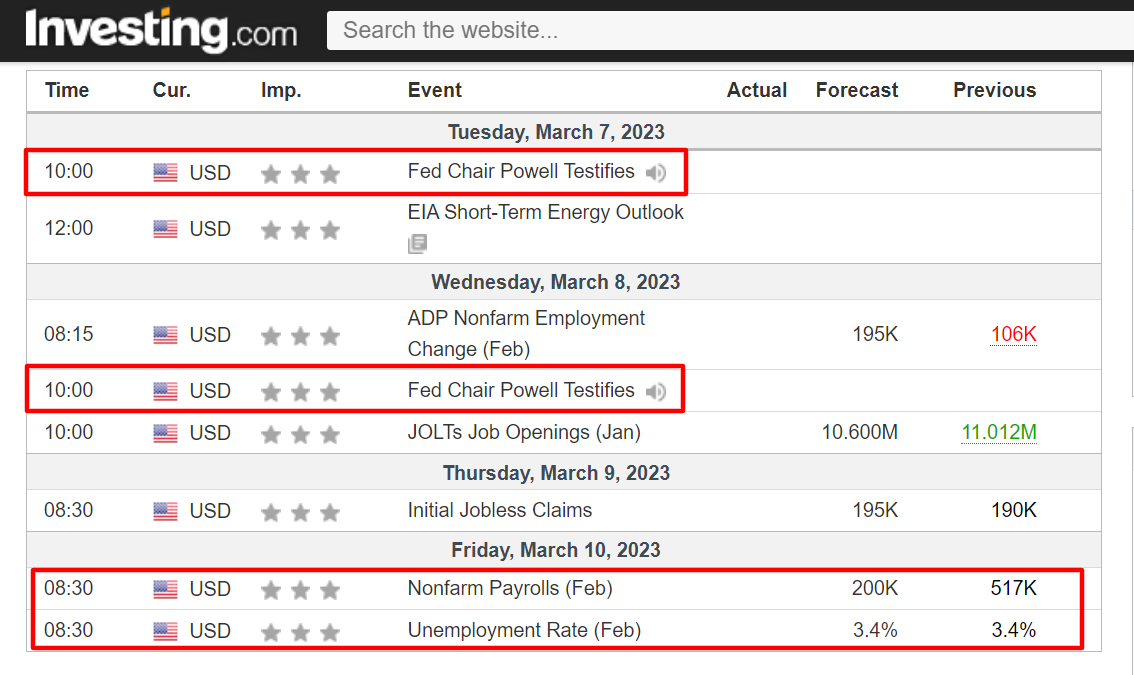
Meanwhile, on the earnings docket, there are just a handful of corporate results due, including Oracle (NYSE:ORCL), DocuSign (NASDAQ:DOCU), CrowdStrike (NASDAQ:CRWD), Ulta Beauty (NASDAQ:ULTA), Gap (NYSE:GPS), BJ's Wholesale (NYSE:BJ), Campbell Soup (NYSE:CPB), JD.com (NASDAQ:JD), and Sea Ltd. (NYSE:SE).
Regardless of which direction the market goes, below we highlight one stock likely to be in demand and another which could see further downside.
Remember though, our timeframe is just for the upcoming week.
Stock to Buy: Dick’s Sporting Goods
I expect shares of Dick’s Sporting Goods (NYSE:DKS) to outperform in the week ahead, with a potential breakout to new 52-week highs on the horizon, as the nation’s largest sporting goods retailer is forecast to deliver upbeat financial results ahead of the opening bell on Tuesday, March 7.
As per moves in the options market, traders are pricing in a significant swing of approximately 7% in either direction for DKS stock following the earnings update.
Consensus estimates call for the Pittsburgh, Pennsylvania-based sporting goods store chain - which operates over 850 retail locations across the U.S. - to report fourth quarter earnings per share of $2.89 on revenue of $3.44 billion, as per Investing.com.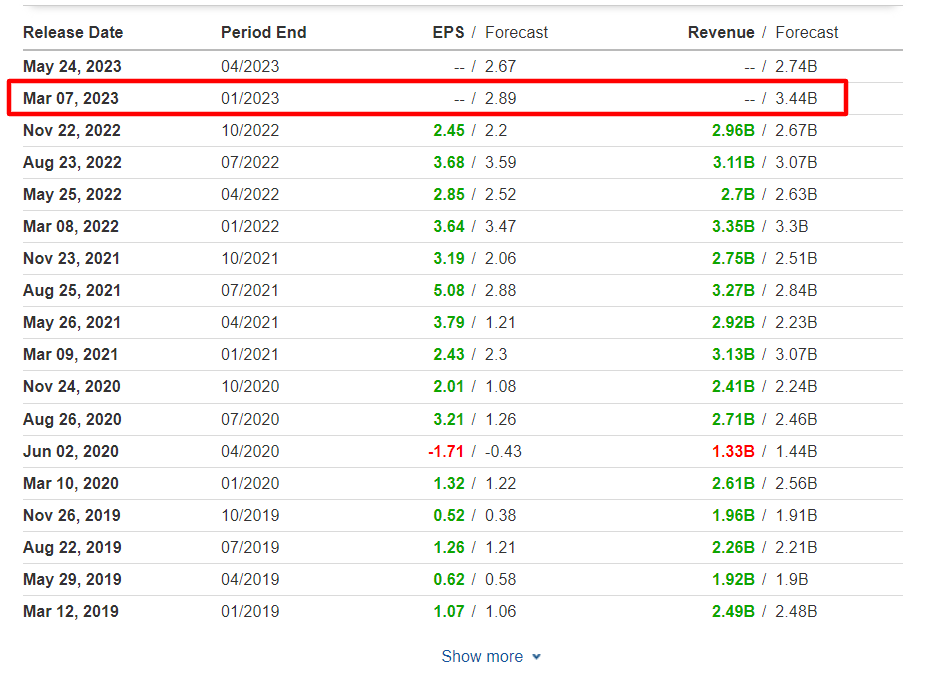
Source: Investing.com
Despite a difficult environment for retailers, Dick’s has beaten Wall Street’s profit and sales expectations for 10 consecutive quarters, a testament to the strength and resilience of its underlying business, its loyal customer base, as well as strong execution across the company.
Q4 same-store sales - which are expected to climb 2.1% compared to last year - could surprise to the upside, in my view, as the retailer benefitted from strong consumer demand across its athletic apparel and footwear product categories during the holiday shopping season.
As such, it is my belief that Dick’s management will provide an upbeat outlook for the year ahead as it benefits from continuing positive tailwinds into 2023, including favorable consumer trends, a disciplined inventory approach, and robust customer demand for sports and recreation clothing and equipment.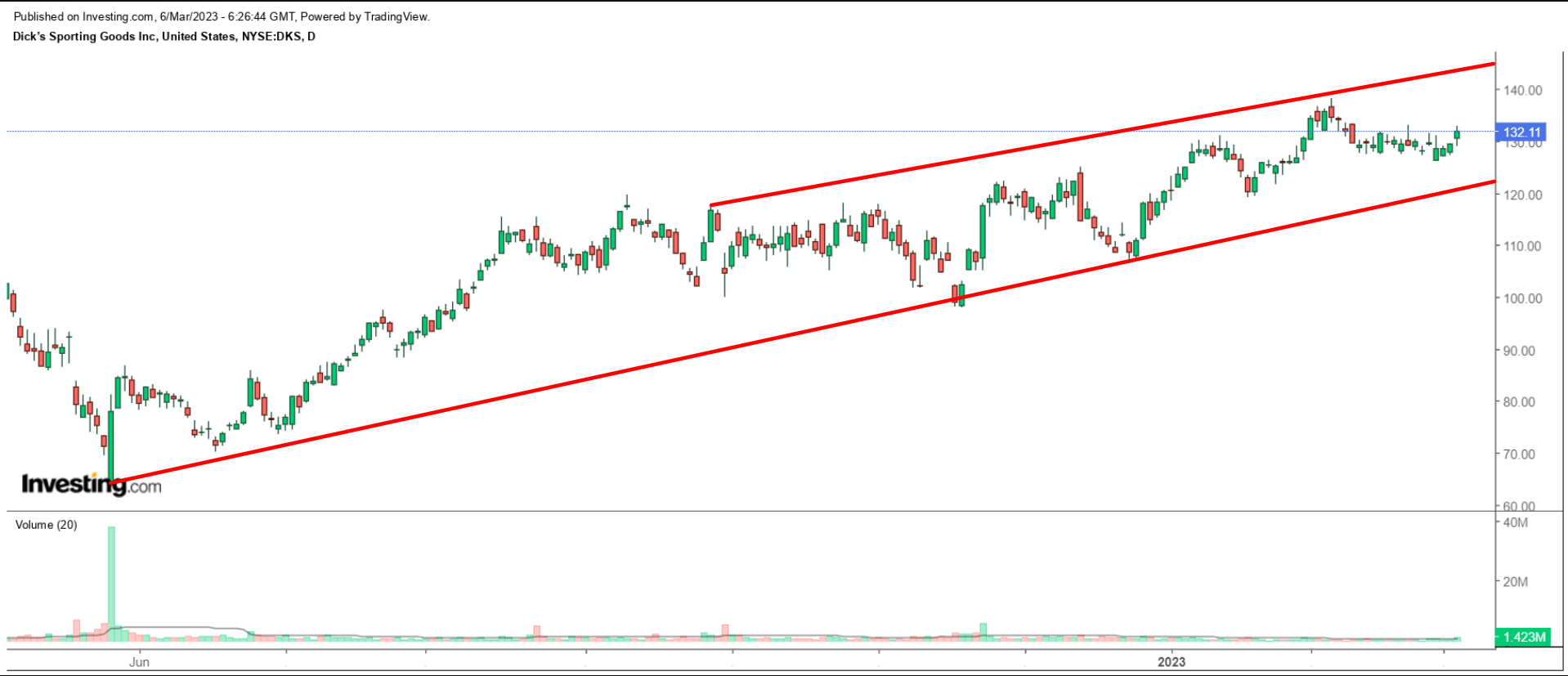
DKS stock ended Friday’s session at $132.11, within sight of its 2023 peak of $138.43 touched on Feb. 6. At current levels, the Dick’s has a market cap of $11 billion, making it the most valuable sporting goods retail chain in the U.S.
Shares are up 9.8% year-to-date, broadly in line with the 10.8% gain recorded by the Retail Select Sector SPDR Fund (NYSE:XRT), which tracks a broad-based, equal-weighted index of U.S. retail companies in the S&P 500.
Stock to Sell: Stitch Fix
I believe Stitch Fix (NASDAQ:SFIX) stock will suffer a difficult week ahead, as the struggling personal-styling company’s latest earnings report will likely reveal another sharp slowdown in both profit and revenue growth due to the tough economic climate that has weighed on demand for clothing.
Stitch Fix’s financial results for its fiscal second quarter are due on Tuesday, March 7, after the U.S. market closes and are once again likely to take a hit from a slowdown in its core personal shopping and styling service.
Market participants expect a sizable move in SFIX shares following the update, with a possible implied swing of 14% in either direction, according to the options market.
Consensus calls for the online wardrobe-styling platform provider to deliver a loss of -$0.33 per share, as per Investing.com, worsening from a net loss of -$0.28 in the year-ago period, mostly due to price cuts and write-downs associated with excess apparel inventory.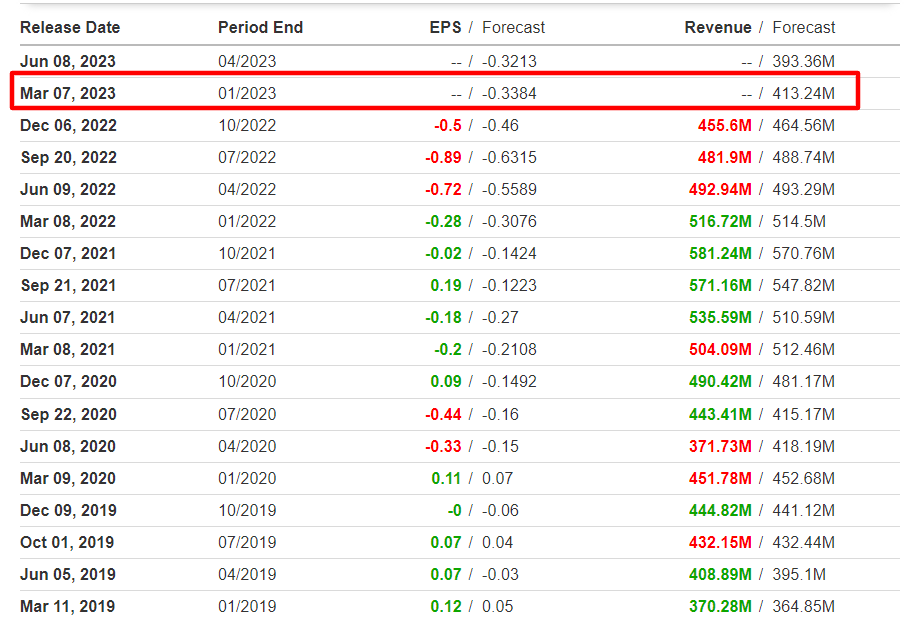
Source: Investing.com
Meanwhile, revenue is seen falling 20% year-over-year to $413.2 million, as the once high-flying online personal styling service provider struggles to deal with worsening fundamentals and a tough macroeconomic environment.
Stitch Fix has missed Wall Street’s top and bottom line estimates for three straight quarters as it struggles from a shift in how the U.S. consumer is spending money.
That leads me to believe that the company will strike a cautious tone in its guidance for the year ahead to reflect higher cost pressures and declining operating margins.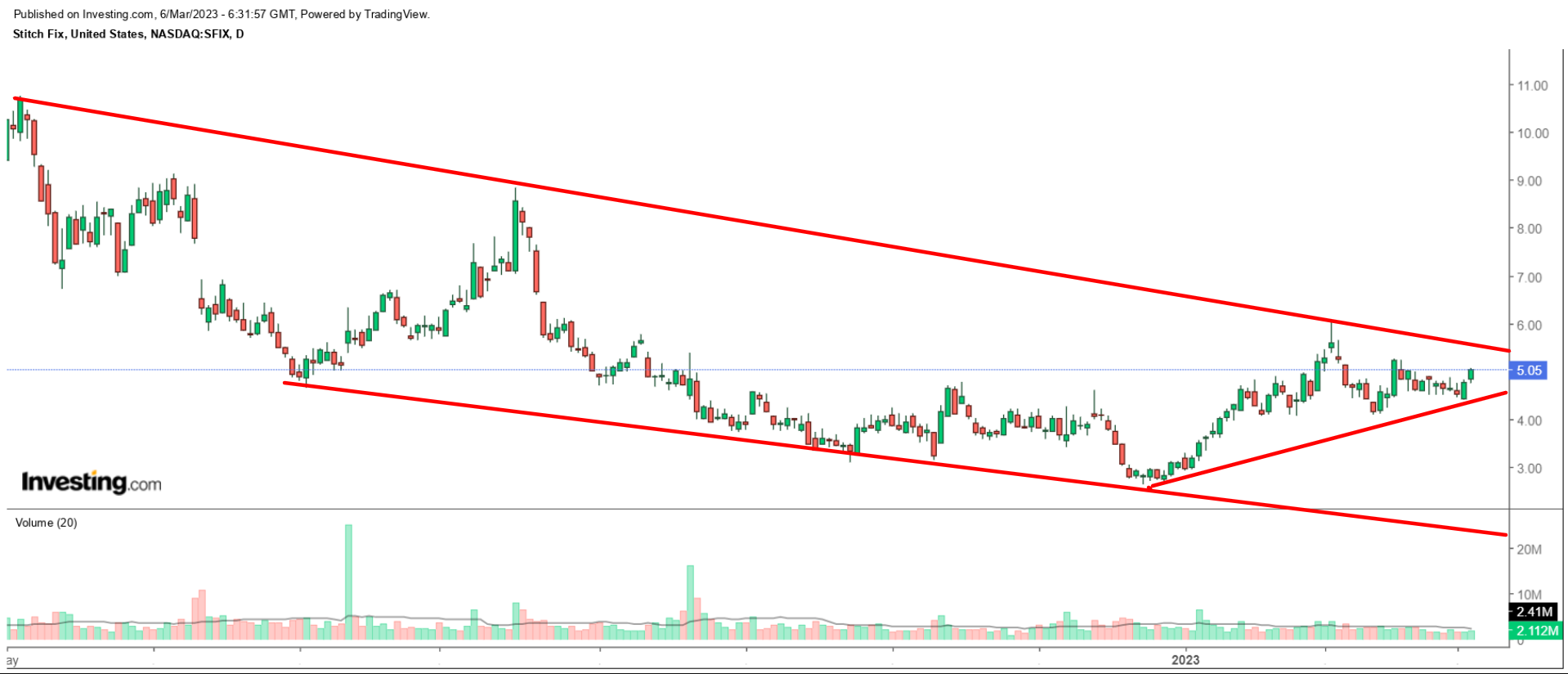
SFIX stock - which fell to an all-time low of $2.63 on Dec. 22 - closed at $5.05 on Friday. At current levels, the San Francisco-based company has a market cap of roughly $560 million, compared to a peak valuation of nearly $10 billion in early 2021.
Shares, which have bounced back to start the new year along with the tech-heavy Nasdaq, are up a whopping 62% thus far in 2023 as investors rotated back into the beaten down growth names of yesteryear. Notwithstanding the recent turnaround, the stock remains over 90% below its January 2021 all-time high of $113.76.
***
Disclosure: At the time of writing, I am long on the Dow Jones Industrial Average, the S&P 500, and the Nasdaq 100 via the SPDR Dow ETF (DIA), the SPDR S&P 500 ETF (SPY (NYSE:SPY)), and the Invesco QQQ Trust ETF (QQQ). I regularly rebalance my portfolio of individual stocks and ETFs based on ongoing risk assessment of both the macroeconomic environment and companies' financials.
The views discussed in this article are solely the opinion of the author and should not be taken as investment advice.
